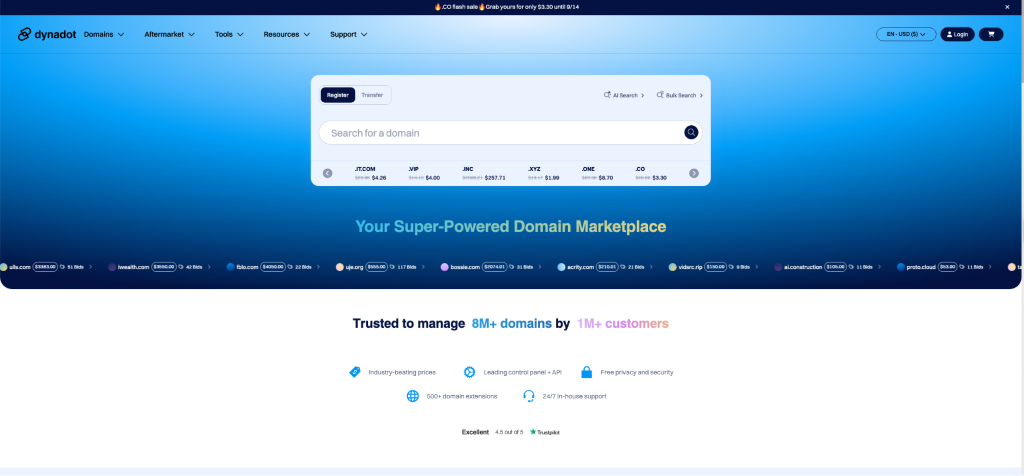
Building Trust Online: Why a Custom Domain Name Matters for B2B Manufacturers
Your website address isn’t just a digital doormat — it’s your first handshake with potential clients. When B2B buyers are scrolling through search results at 2 AM (because that’s when procurement managers do their best work), your domain name is making or breaking their first impression before they even click through.

Here’s the thing most manufacturers miss: there’s a massive difference between owning a domain and having a website. Think of it like owning property versus renting an apartment. Your domain is the land — you control it, you own it, it’s yours. Your website? That’s the house you build on top.
What’s the Real Difference Between a Domain and Website?
Let’s clear this up once and for all. Your domain name is your unique web address — like manufacturingpro.com. It’s the digital real estate you purchase and control. Your website is everything visitors see and interact with when they type in that address.
Picture it this way: if the internet were a city, your domain would be your street address, and your website would be the actual building people visit. You can change your website design, rebuild it completely, or even take it down temporarily — but your domain stays the same.
This distinction matters more than you think. Recent industry data shows that 77% of consumers consider domain names “important or very important” when evaluating brands online. For B2B buyers who are about to drop serious cash on manufacturing partnerships, that percentage shoots even higher.
Why Your Domain Choice Impacts B2B Trust
Trust is everything in B2B manufacturing. You’re not selling someone a $20 gadget — you’re potentially becoming a critical supplier in their production chain. When procurement teams are vetting potential partners, they’re looking for stability, professionalism, and longevity.
Your domain sends instant signals about all three. Research on domain psychology reveals that certain domain characteristics directly impact trust levels:
Memorability leads the pack. Forty-seven percent of survey respondents cite this as the top domain characteristic, followed by shortness (29%), brand alignment (28%), and uniqueness (25%). When a purchasing manager can easily remember and share your domain with their team, you’ve already won half the battle.
Domain age matters more than you’d expect. Studies show that domain longevity signals stability and commitment — two things manufacturing buyers desperately want in their supplier relationships. A domain that’s been around for years suggests you’re not a fly-by-night operation.
The extension still counts. While over 1,200 new gTLDs exist today, .com remains king. With over 157.2 million registrations, it’s the gold standard for trust. B2B buyers might raise an eyebrow at a .biz or .info extension, but they’ll never question a .com.
Current Domain Trends Shaping B2B Manufacturing
The domain game is changing fast. Global domain registrations hit 368 million in early 2025, and smart manufacturers are paying attention to where the industry’s headed.
Industry-specific extensions are gaining ground. Extensions like .tech, .health, .dev, and .xyz are becoming popular with manufacturers targeting specific sectors. If you’re in medical device manufacturing, a .health domain might actually boost credibility with healthcare buyers.
Geo-targeting is getting serious. Country-code TLDs like .de for Germany or .cn for China are becoming standard practice for manufacturers with international operations. Local domains signal local commitment — something overseas buyers appreciate.
Voice search is changing the game. Voice-optimized domains are becoming critical as more buyers use mobile and voice assistants for initial research. Short, easily pronounced domains aren’t just trendy — they’re practical.
How Smart Domain Strategy Builds Credibility
The manufacturers who get this right aren’t just picking pretty names – they’re building digital fortress walls around their brand reputation.
Domain security is non-negotiable. DNSSEC implementation is becoming standard as cyber threats increase. When you’re handling sensitive manufacturing data and client information, advanced domain security protocols signal that you take data protection seriously.
Consistency across multiple domains reinforces brand strength. Smart manufacturers secure their main brand domain plus regional variations, protecting against impersonation and ensuring consistent brand experience across all touchpoints.
Premium domains are worth the investment. Industry experts predict continued growth in premium domain demand as digital competition intensifies. A memorable, authoritative domain isn’t just a nice-to-have — it’s a competitive advantage.
Common Domain Mistakes That Kill Trust
Even experienced manufacturers stumble here. The most damaging mistakes aren’t technical — they’re strategic.
Choosing confusing extensions. While new TLDs offer opportunities, lesser-known extensions can dampen trust with B2B buyers who aren’t familiar with them. If your target audience is conservative (and many manufacturing buyers are), stick with what they know.
Ignoring domain disputes. Rising impersonation attempts make defensive domain strategies critical. Competitors or scammers registering similar domains to yours can seriously damage your reputation.
Overlooking mobile and voice considerations. If your domain is a tongue-twister or requires explanation, you’re losing potential clients who discover you through voice search or mobile browsing.
Future-Proofing Your Domain Strategy
The domain landscape keeps shifting. AI tools for domain search and registration are improving brand relevance and SEO competitiveness. Blockchain-based domains might mainstream for enhanced security.
Smart manufacturers are already preparing. They’re securing multiple relevant domains, implementing advanced security protocols, and choosing names that work across all digital channels — from traditional web browsing to voice search to whatever comes next.
The bottom line? Your domain isn’t just your web address — it’s your digital business card, security system, and trust signal all rolled into one. In B2B manufacturing, where relationships and reputation drive everything, getting this right isn’t optional.
FAQs
What’s the actual difference between a domain name and a website? A domain name is your unique web address (like yourcompany.com) that you register and own. A website is the collection of pages, content, and functionality that visitors see when they type in your domain. Think of the domain as your street address and the website as your actual building.
Why do .com domains still matter for B2B manufacturers? Dot-com domains carry the highest trust factor with B2B buyers. With over 157 million registrations, they’re universally recognized and trusted. While newer extensions exist, conservative B2B buyers often view .com as more legitimate and established.
How long should a domain name be for maximum trust? Research shows that 29% of people prioritize shortness in domain names. Aim for 6-14 characters when possible. Shorter domains are easier to remember, type, and share — critical factors when procurement teams are sharing your information internally.
Should manufacturers register multiple domain extensions? Yes, especially for brand protection. Register key variations (.com, .net, .org) and relevant country codes if you operate internationally. This prevents competitors from registering similar domains and protects against impersonation attempts.
How do I know if my domain name builds trust with B2B buyers? Test for memorability, pronunciation ease, and brand alignment. If it takes explanation or multiple attempts to spell correctly, it’s probably not ideal for B2B use. The best domains are instantly understood and easily shared in both digital and verbal communication.



